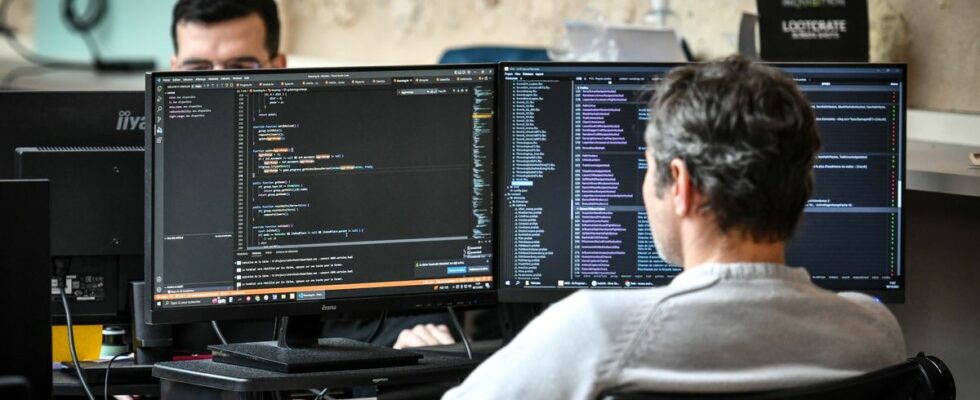On this strike day, processions throng the streets to protest against the bill to reform the pension system. Among the demonstrators, workers from all sectors… Including tech, often largely forgotten by social struggles. The large family of professions related to new technologies brings together very different professions and realities, on the developer side or in the video game industry. A common point: the fact of being a sector where unionization is weak. However, since the protests against the Labor Law of 2016, new forms of engagement are emerging in the tech industries.
This is particularly the case in video games, with the creation of the National Union of Video Game Workers (STJV) in 2017. “It started with different groups of people who got together and realized the need to defend themselves in video games, even more than before,” explains Antoine, one of its members. The union wants to be independent, to best meet the specific needs of the sector. “Tech is a sector very subject to the capitalist market, we talk about suffering at work linked to an intensive pace, contradictory instructions, risks of psychosocial violence…” adds Marie, member of the STJV. More recently, in 2019, it was on the side of developers and other tech professions that the collective was created We are the tech, whose call brought together nearly 3,000 signatories. “We wanted people to go out in the street, meet, get organized with people who don’t always come from the area,” explains Kévin, a member of the collective. The pension reform bill was then a new opportunity for unions and collectives to mobilize.
A poorly unionized sector
Historically, the tech industry is not the most used to protests and pickets. “Tech has traditionally been relatively unpoliticized and unorganized. There is a double image: on the one hand the tradition linked to a libertarian philosophy and the development of free software; but above all an entrepreneurial culture, like a start-up nation” summarizes Kévin. As for the video game industry, “it’s a very little politicized environment, which has not necessarily known the unions” points out Antoine of the STJV. Especially since the demographics of the sector are different: tech workers are often young. “There is a lot of turnover, people are leaving exhausted, and have not experienced the full momentum of certain social mobilizations. And then we have a particularity in the video game sector, it is the presence of many queer people, who fight and are politicized, which creates a real emulation in this sector” adds Marie.
Especially since if unions exist in tech, they have long had a bad image: the corporate culture of start-ups or other video game studios is often based on the idea of a “big family”, where the relationships are relaxed, which makes the confrontation with employers more complex. “And there are also plenty of people who feel closer to a Silicon Valley billionaire than to a worker,” Kevin quips. The tech sector is also marked by the presence of many independent workers, accustomed to self-entrepreneurship. But above all, for a long time, tech was seen as a professional El Dorado. “It’s also very much linked to the way the industry works: until recently, it was total full employment, we were highly sought-after and well-paid profiles,” explains Kévin. But the tide is turning in Silicon Valley: Google, Meta, Twitter, Microsoft or even Spotify are laying off workers extensively… Which is pushing workers to get closer to unions and collective struggle.
learn to strike
For several months, the STJV and On est la tech have been multiplying initiatives to “make it clear that we would also be affected by the pension reform”, as Kévin explains, and try to convince their colleagues to take to the streets. “These are sectors where there is no tradition of strikes, so we must remember labor law, and educate people on how strikes work,” he adds. On the side of the STJV, “we try to make people realize that they will have a retirement, and that if the beginnings of their careers are very choppy or that we chain periods of unemployment, we will leave late, and it starts to sting recalls Antoine. In short, recontextualize and repoliticize. “We do groundwork: what is a demonstration, what is a strike, how does it work… We have a lot of first times, first banners” adds Marie.
In these tech unions or collectives, the goal is to show that there are concrete ways to fight for their rights, but also to build bridges with other organizations. “When we launched the collective, we had a lot of developers with skills, and we created a working group to serve other organizations,” says Kévin. Since then, On est la tech has been organizing pre-demonstration meetings (so as not to walk alone), meetings to get organized. “We want to take the step of going to the streets and creating a link with other people”. If the date of March 7 was long awaited, Kévin recalls that their fight will continue on March 8, International Women’s Rights Day, in particular to highlight feminist struggles and the question of the feminization of tech professions.

